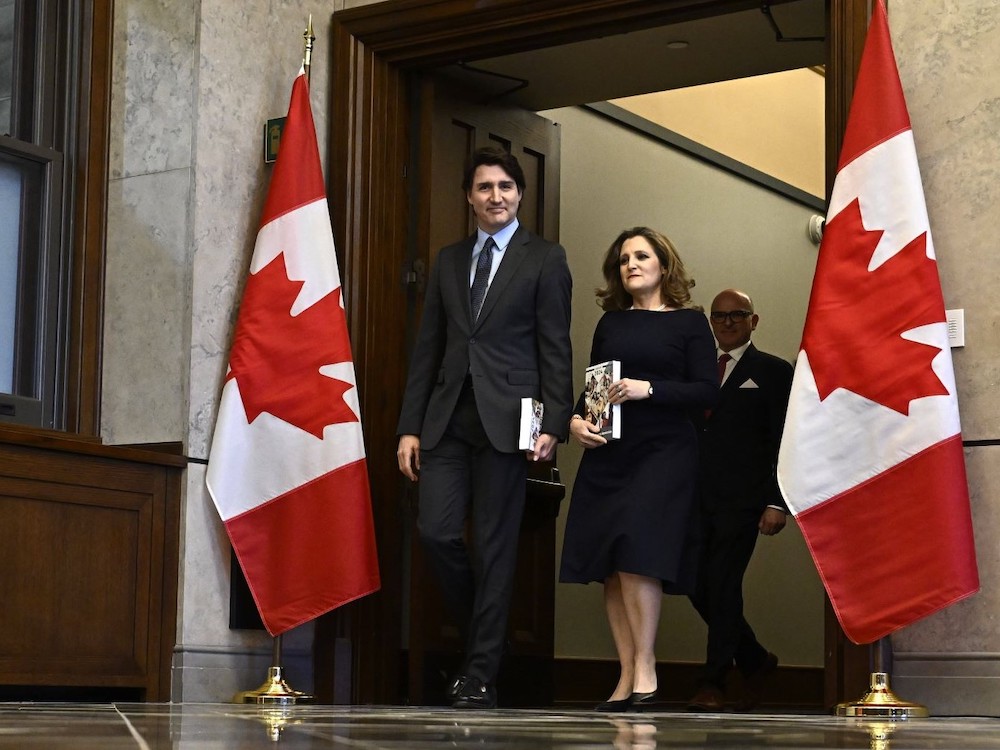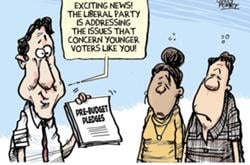The Liberal government formally unveiled its Hail Mary federal budget Tuesday, a political document designed to revive the party’s dismal electoral prospects and beat back the surging Conservatives.
In a nutshell, Finance Minister Chrystia Freeland announced plans to extend a financial helping hand to a wide swath of Canadians, with special attention on millennials and gen-Xers. That was an important part of the coalition that elected Justin Trudeau in 2015, and the party badly needs to entice them back.
How will the government pay for its massive new spending? Contrary to pre-budget rumours, it will not be by raising income taxes on wealthy Canadians or hiking taxes for certain corporations. It will be by raising the capital gains tax, and running yet another major deficit.
Trailing the Conservatives by 20 points in the latest Abacus poll, a wipeout should that number hold, there was not much choice for the Liberals but to go big on the hot-button issues of the day.
And big the government went, including a whopping $50 billion in new spending, and a deficit of nearly $40 billion. No surprise there. The Liberals have run a budgetary deficit every year since their election in 2015.
All in, Freeland announced a mountain of new government spending and loan programs covering a variety of top-of-mind issues: housing, affordability issues for younger Canadians, inflation, youth mental health, a national school food program, military spending, artificial intelligence and “newish” social programs like pharmacare and a dental plan.
Despite the scope of this new spending, there was something anti-climactic about Budget 2024. That’s because the government discarded the traditional secrecy that normally surrounds federal budgets.
Instead, for the last three weeks, Liberal cabinet ministers and the PM turned tease into striptease, baring all. Weeks before today’s formal announcement, they laid out in detail much of what the finance minister told Parliament Tuesday.
The prime minister, for example, announced the government’s multibillion-dollar housing program well ahead of the federal budget. The plan includes money to build apartments and affordable units.
It was the same story with the government’s $500-million fund for youth mental health. The finance minister herself revealed the fund, which she said was designed to set up youth “for success,” a week before today’s budget.
The PM continued the pre-budget leak-and-speak in Montreal last week when he announced that $2.4 billion would be set aside to develop Canada’s capacity in artificial intelligence. Most of the money, $2 billion, will be invested in providing access to computing capabilities and technical infrastructure.
The Liberal pitch comes down to this: while the Conservatives have hung their hat on cutting taxes and government spending, Justin Trudeau is saying that his administration can be fiscally responsible while at the same time engaging in new spending.
The big question is, can the Liberal strategy work, and just as important, can they sell it? Only time will tell.
What the NDP wanted
The government’s coalition partner, the NDP, did not have a great day. While Jagmeet Singh took credit for forcing the government into a national school food program and other policies like free contraception, the NDP did not get what it really wanted — a wealth tax on the wealthiest Canadians, and an increased tax on corporations.
Nor did Singh think that the budget did anything to mitigate desperate Indigenous housing issues or do enough to deal with the issue of “generational fairness.” The NDP leader was also highly critical of the Trudeau government’s decision to cut 5,000 jobs from the federal public service.
Despite the disappointments, Singh noted that although the Liberals didn’t do enough to help Canadians, the Conservatives wanted to cut programs like pharmacare and the newly minted dental program.
For that reason, it is all but certain that the NDP will support the budget. But whether they will commit to keeping the minority Liberal government afloat into 2025 is another matter.
The Liberal gamble that they can sell a spending budget that comes with yet another hefty deficit is far from a slam dunk. After all, Ottawa is already paying a stunning $54 billion a year in debt charges on previous borrowings.
Critics of their latest expenditures point to the fact that much of the planned spending is “backloaded,” meaning that any real impact will not be felt for years. Trudeau talks about building 3.5 million new housing units over the next seven years. But can he, when some experts have placed the true cost of dealing with the housing shortage at a staggering $2 trillion, far more than the $20 billion the Liberals have set aside in the budget?
And then there’s the politics. Some provinces, like Quebec and Ontario, have flatly rejected Trudeau’s housing announcement as an intrusion into provincial jurisdiction.
That’s because Ottawa has set conditions for accessing the housing fund. It wants provinces to eliminate single-family zoning and allow the building of fourplexes.
Should a province refuse that condition, both the PM and Housing Minister Sean Fraser have said Ottawa will deal directly with municipalities. Those are fighting words in several provinces.
Gauging the mood
And then there is the mood of the country to consider. Are Canadians in the mood for more government spending?
According to the latest Angus Reid poll, the answer is a resounding “No.” The poll found that nearly three in five Canadians believe that federal finances have grown too large and that cuts are needed.
So Budget 2024 can serve as fodder for Conservative Leader Pierre Poilievre’s talking points. In responding to what Chrystia Freeland brought before the House, Poilievre returned to familiar territory.
He reminded Canadians that rent and mortgage payments have doubled under Trudeau’s watch, despite his all but forgotten promise to balance the budget.
He reminded Canadians that there are numerous homeless encampments across the country, including 35 in Halifax.
And he compared the PM’s latest spending agenda to a pyromaniac “spraying gas on the fire of inflation.”
The story of the coming months will be which message Canadians believe. Pierre Poilievre, who claims that under the Liberals, “government is rich and the people are poor,” or Justin Trudeau, who says the budget amounts to “fairness for every generation.” ![]()
Read more: Federal Politics

















Tyee Commenting Guidelines
Comments that violate guidelines risk being deleted, and violations may result in a temporary or permanent user ban. Maintain the spirit of good conversation to stay in the discussion and be patient with moderators. Comments are reviewed regularly but not in real time.
Do:
Do not: